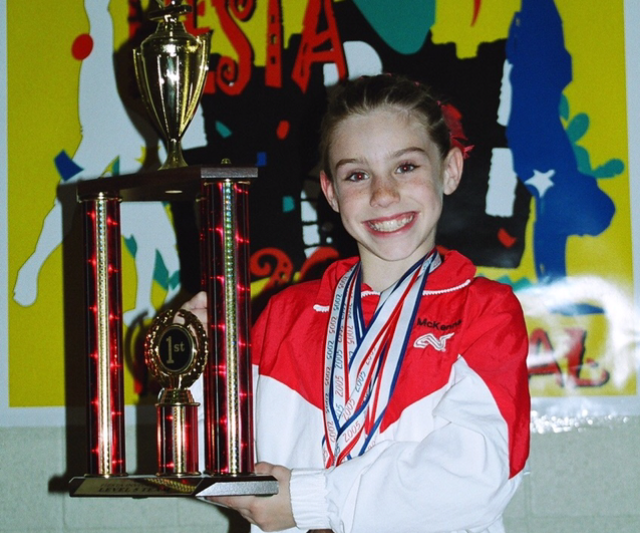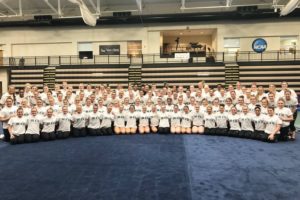Abuse Allegations Surprise Former Károlyi Ranch Campers
By Maleeha Syed
Reporting Texas

A young Stanley poses with her trophy. She estimates she was about 8 years old then. Photo courtesy of McKenna Stanley.
When the news notification popped up on her phone, Meris Teague did not pay much attention. Then she got a text from her mother about sexual abuse allegations against a U.S. gymnastics team doctor with ties to Károlyi Ranch.“I was just heartbroken,” Teague said. “You never know. It easily could have happened to anybody I was at camp with.”
While still in elementary school, Meris and other young gymnasts from her home state of Oklahoma attended a weeklong camp at Károlyi Ranch, north of Houston, to train with the legendary husband-wife coaching team behind Olympic gold medalists like Mary Lou Retton and Kerri Strug.
She fondly remembers warming up each morning to fun music and breaking into groups for instruction. Teague, now a member of the University of Central Oklahoma cheer team, held Károlyi Ranch in higher regard than other gymnastics centers because of her experiences there. Her mom, Sharra, thought the same.
“I never once was concerned about sending her to their camp, you know?” Sharra Teague said. “They were reputable. Everybody knows the Károlyis in the gymnastics world.”
The fame that Béla and Mártha Károlyi built for decades, starting in the 1970s, took on a darker tone last summer when a USA Gymnastics physician, Dr. Larry Nassar. was accused of sexually assaulting gymnasts at Michigan State University and Károlyi Ranch. The Károlyis have said they had no knowledge of any impropriety.
Since the allegations against Nassar emerged, more than 250 gymnasts have come forward with accounts, describing the lasting psychological and physical impacts. Some of his victims were at the ranch where Mártha Károlyi spent the bulk of her time training national team gymnasts. She led the U.S. team for 15 years before retiring in 2016.
Nassar pleaded guilty to charges of criminal sexual conduct and was sentenced to serve 40 to 175 years in prison. Shortly after his trial, Károlyi Ranch shut down.

Gymnasts, including Stanley, wore teal shirts in solidarity with victims of sexual assault during an event in April. Photo Courtesy of McKenna Stanley.
Gov. Greg Abbott has ordered an investigation into activities at the ranch, located in Huntsville. The Texas Rangers are working with the Walker County Sheriff’s Office.
Last week, Béla and Mártha Károlyi broke their silence about the allegations, appearing on NBC’s “Dateline.” Mártha Károlyi was emphatic that “any child who was violated by Nassar, it’s a crime and it’s so sad.” But, she asked, “How I could see?” when parents of gymnasts in the same room while Nassar treated their children had no hint of misconduct.
A well-known U.S. gymnast from the 2012 London Olympics, McKayla Maroney, also appeared on the “Dateline” broadcast. “I thought I was going to die,” Maroney said as she gave a harrowing account of Nassar’s abusive behavior.
As the news initially unfolded, Sharra Teague wondered if her daughter encountered any trouble at Károlyi Ranch all those years ago, when Meris was 9. Though Meris did sustain a foot injury at the facility, she does not recall meeting Nassar.
“I’m completely shocked,” Meris Teague, now 21, said. “Especially that it would have made it that far. So many people. I just don’t understand.”
Though she grew out of competitive gymnastics, she coaches the sport recreationally and tries to make it a fun experience for the young athletes. Growing up around people whose parents coached, she said, “they put all the pressure on their daughters to be perfect. And that just burns them out a little faster.”
Her mother witnessed the high level of stress coaches and adults placed on gymnasts.
“In the gymnastics world, there is a huge amount of pressure,” Sharra Teague said. “We don’t know it at the Olympic level … but we saw it in our local level.” Her daughter once competed with a foot injury, and on another occasion with staples in her head.
Despite its rigorous nature, some gymnasts continue with the sport well beyond high school.
“They tell you that you can’t cry,” said McKenna Stanley, a collegiate-level gymnast at Southeast Missouri State University. “Or they tell you that you can’t be afraid. So it’s very mentally draining and mentally tough. … It really shaped who I am just because I went through that.”
Stanley considered how difficult gymnastics is compared to other sports. From bouncing around her home and hanging off grocery carts as a toddler to practicing nearly 40 hours a week, Stanley never saw her loyalty diminish. She went to Károlyi Ranch multiple times for clinics and testing, remembering it as secluded with little cell phone reception.
“The food isn’t that great,” she said. “But as like a kid it was like, ‘Oh I’m going away from home to do gymnastics. This is cool.’”
While she never experienced sexual abuse in the sport, she joined in with wider NCAA efforts, as gymnastics teams wore teal ribbons and shirts in solidarity with victims.
“Just with our sport, it’s very easy to kind of come across that kind of stuff,” Stanley said. “Just because you have people spotting you. And whenever they spot you, they might touch you in the wrong spot. … But I think even now, people are going to be looking out for it even more.”
Some Texas gymnastics centers are already looking out for it, with safety measures solidified long before the Nassar trial. Some of the rules at Texas Star Gymnastics in Tomball include requiring bathroom doors remain open so people cannot crawl under the stalls; not allowing hide-and-go-seek with the lights out; and keeping cameras in the building.
“We’ve always watched out for stuff like that because these guys are kids, you know?” said Nancy Gomez, owner of Texas Star Gymnastics.. “So we didn’t have to implement something we already had in place.”
Gomez’s center is a member club of USA Gymnastics and has had national team members in the past. Another USAG member club, Boerne Gymnastics Center, allows parents to watch practices and does not have private areas. “We have always had an open-door policy,” said Lorna Spellman, the owner. “We really haven’t had to change anything. However, you know, we’re being a little more proactive about the parents knowing what our policies are.”
Spellman believes not adhering to important procedures — like those she has in place—played a role in Nassar’s getting away with the abuse for years.
“You need to be aware — it can happen anytime, anywhere — and to speak up if you think that something’s going on,” she said, wanting children to know “if they’re uncomfortable with something, that adults are going to trust them when they speak about it.”
When she has children of her own, Meris Teague plans to put them in gymnastics. But the scandal has made her realize she might need to know more about the environment and those around them. Ultimately she does not want people to be afraid to come forward with their stories, boiling it down to “more awareness. Bringing it to awareness that girls can speak up and they’re not going to lose their position in the Olympics.”